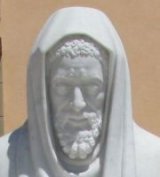Analysis of My Heart Is in the East
Judah Halevi 1075 (Toledo) – 1141 (Jerusalem)
My heart is in the east,
and I am in the distant west.
How can I taste what I eat,
and how can it be sweet?
How can I fulfill by vows and oaths,
as long as Zion is in the chains of Edom,
and I am in the binds of the Arabs?
| Scheme | XX AA XXX |
|---|---|
| Poetic Form | |
| Metre | 111001 01100101 1111111 011111 111011101 11110100111 0110011010 |
| Closest metre | Iambic tetrameter |
| Characters | 224 |
| Words | 61 |
| Sentences | 3 |
| Stanzas | 3 |
| Stanza Lengths | 2, 2, 3 |
| Lines Amount | 7 |
| Letters per line (avg) | 23 |
| Words per line (avg) | 8 |
| Letters per stanza (avg) | 54 |
| Words per stanza (avg) | 18 |
About this poem
The point of this verse is the poet’s emphatic sense that he cannot function fully as long as the Temple is destroyed.
Font size:
Citation
Use the citation below to add this poem analysis to your bibliography:
Style:MLAChicagoAPA
"My Heart Is in the East" Poetry.com. STANDS4 LLC, 2024. Web. 23 May 2024. <https://www.poetry.com/poem-analysis/117047/my-heart-is-in-the-east>.


Discuss this Judah Halevi poem analysis with the community:
Report Comment
We're doing our best to make sure our content is useful, accurate and safe.
If by any chance you spot an inappropriate comment while navigating through our website please use this form to let us know, and we'll take care of it shortly.
Attachment
You need to be logged in to favorite.
Log In